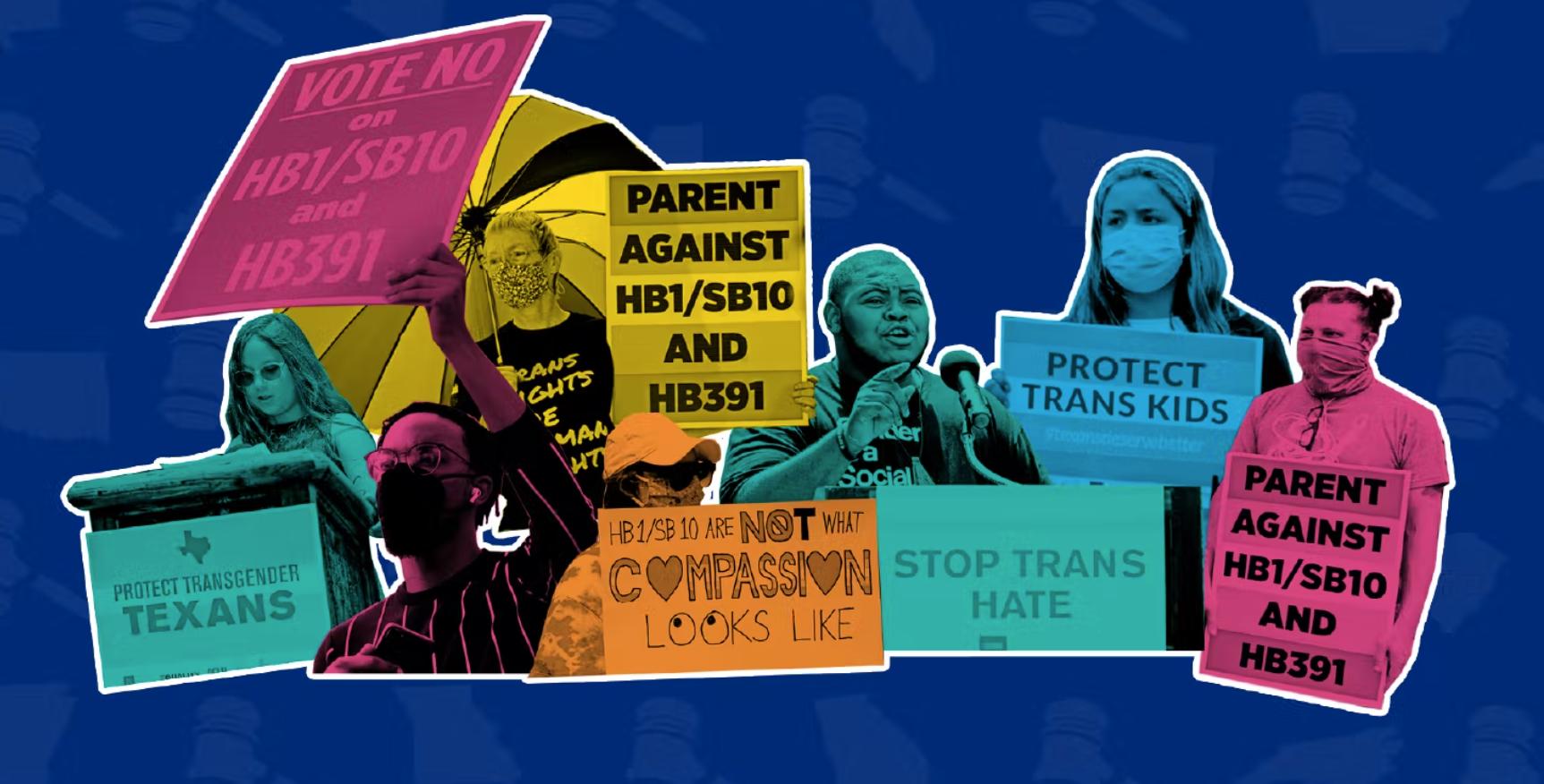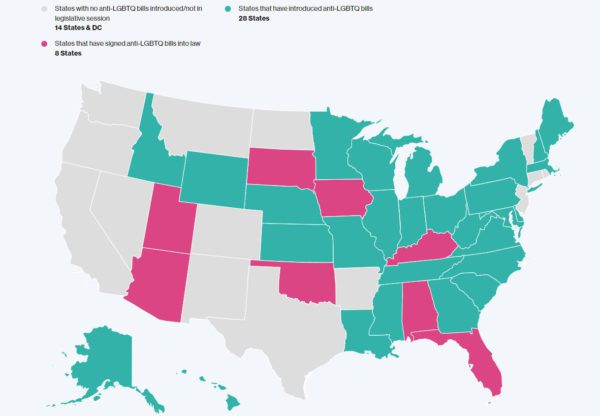Politics
Overview of over 300 anti-LGBTQ+ bills in 2022
As Republican politicians continue to push for limits to LGBTQ+ rights, many LGBTQ+ people & their allies promise to continue fighting

In May 2021, the Human Rights Campaign (HRC) officially announced the worst year for anti-LGBTQ+ legislation in recent history. At the time, state lawmakers introduced over 250 bills – from anti-Trans sports legislation to religious refusal measures – in statehouses across the country, 17 of which were enacted into law.
Now, LGBTQ+ rights in states seem to be taking even more of a hit. According to HRC, over 300 anti-LGBTQ+ bills have surfaced in 36 Legislatures. As the legislation increases – 41 such measures were introduced in 2018 – so does the number of bills passed and enshrined into state law, though LGBTQ+ advocates often challenge the laws in court.
The legislation overwhelmingly targets Trans youth, according to the organization, from blocking participation in sports to baring access to gender-affirming care. Lawmakers have also attempted, and in some cases passed, legislation limiting how LGBTQ+ issues can be taught in schools and keeping Trans kids from using restrooms that correspond with their gender identity.
“2022 is on track to surpass last year’s record number of anti-transgender bills,” Cathryn Oakley, state legislative director and senior counsel at the HRC, told the Blade, calling the “legislative attacks” on Trans youth “craven, baseless, and an effort to create more division, fearmonger, and rile up radical right-wing voters at the expense of innocent kids.”
Proponents of the bills say they are to “protect” parental rights, children and religious freedom. However, LGBTQ+ advocates and people continue to denounce the legislation as discriminatory and harmful.
This year, one of the most talked-about anti-LGBTQ+ measures was Florida’s so-called “Don’t Say Gay” bill, which Republican Gov. Ron DeSantis signed into law last month. The legislation will ban classroom instruction about sexual orientation and gender identity in grades K-3 if it survives legal challenges.
Days after DeSantis signed the bill, the first lawsuit against the measure emerged, arguing the statute “would deny to an entire generation that LGBTQ people exist and have equal dignity.”
“This effort to control young minds through state censorship —and to demean LGBTQ lives by denying their reality — is a grave abuse of power,” the lawsuit says.
Since Republican sponsors successfully pushed the bill through, other states have followed in Florida’s footsteps. Ohio, for example, introduced its version of the legislation roughly a week after DeSantis’ signature.
In Alabama, Republican Gov. Kay Ivey signed an anti-Trans bathroom bill with a last-minute amendment to keep educators from discussing gender identity and sexual orientation in grades K-5. Ivey didn’t stop there, also signing a bill that would ban gender-affirming care for minors.
Like Florida, LGBTQ+ advocates were quick to announce legal challenges to the legislation. Some of the most prominent LGBTQ+ and civil rights organizations – including the HRC, GLAD and Southern Poverty Law Center (SPLC) – announced a legal challenge in federal court against Alabama’s gender-affirming care ban.
In terms of legislation introduced, Tennessee has far outpaced other states, according to LGBTQ+ rights organization Freedom for All Americans. The group’s legislative tracker found over 30 bills limiting LGBTQ+ rights in the state – including a “Don’t Say Gay” bill and a ban on LGBTQ-themed literature in schools. But, unlike other Republican-controlled states, none have made it out of the statehouse.
Arizona has also been a hotspot for anti-LGBTQ+ legislation, with at least 17 bills, according to Freedom for All Americans. In March, Republican Gov. Doug Ducey signed two bills limiting the rights of Trans people in the state – one banning some types of medical care for Trans youth, and the other preventing Trans students from participating in school sports consistent with their gender identity.
“Across the country, moderate Republicans are struggling—and too often failing—to stop the takeover of their party by dangerous extremists,” Shannon Minter, legal director for the National Center for Lesbian Rights (NCLR), told the Blade at the time, adding: “We are in danger of watching large segments of our nation give way to authoritarian extremism.”
In other states, anti-LGBTQ+ legislation became law without support from its governor – Democratic or Republican. In fact, two Republican governors vetoed anti-Trans sports bills in late March.

Utah Gov. Spencer Cox and Indiana Gov. Eric Holcomb, both Republicans, vetoed legislation that barred Trans youth from participating in sports. Cox said the bill had “several fundamental flaws and should be reconsidered,” while Holcomb said the measure was in search of a problem.
In the end, however, the Utah House overturned Cox’s veto days later. Holcomb’s veto still stands.
“This [Utah] bill focuses on a problem of ‘fairness’ in school sports that simply does not exist — but its negative impacts on the mental health and well-being of trans and nonbinary youth are very real,” said Sam Ames, director of advocacy and government affairs at The Trevor Project. “These youth already face disproportionate rates of bullying, depression, and suicide risk, and bills like this one will only make matters worse.”
In recent weeks, two Democratic governors vetoed anti-LGBTQ+ legislation from their Republican-controlled legislatures.
Kentucky Democratic Gov. Andy Beshear vetoed legislation that would ban Trans girls from playing on sports teams in Kentucky schools that match their gender identities from sixth grade through college. GOP lawmakers quickly overturned the decision.
“Shame on the Kentucky General Assembly for attacking trans kids today,” said Chris Hartman, executive director for the Fairness Campaign. Shame on our commonwealth’s lawmakers for passing the first explicitly anti-LGBTQ law in Kentucky in almost a decade.”
Kansas Democratic Gov. Laura Kelly vetoed last weekend two anti-LGBTQ+ measures, the “Parents’ Bill of Rights” and the “Fairness in Women’s Sports” Acts.
GOP lawmakers in Idaho decided last month to effectively kill a bill criminalizing gender-affirming care, one of the most extreme proposals in the country. It would have made it a felony — punishable by up to life in prison — to provide minors with hormones, puberty blockers or gender-affirming surgery.
In a statement, Idaho Senate Republicans said they “stongly” oppose “any and all gender reassignment and surgical manipulation of the natural sex” on minors. But they also wrote that the controversial legislation “undermines” a parent’s right to make medical decisions for their children.
“We believe in parents’ rights and that the best decisions regarding medical treatment options for children are made by parents, with the benefit of their physician’s advice and expertise,” the senators wrote.
Texas is one of the 14 states with no anti-LGBTQ+ legislation, as the state only holds legislative sessions in odd years. However, the Lone Star State has made headlines for anti-Trans orders from Republican Gov. Greg Abbott.
Abbott, in February, directed the Texas Department of Family and Protective Services (DFPS) to investigate reports of gender-affirming care on minors as “child abuse.” The order followed an official opinion from state Attorney General Ken Paxton that called the treatment a form of “child abuse” under Texas law.
Since, two Texas judges have ruled against the policy – one in district court and the other after an appeal. Still, Paxton vows to keep fighting for the order in court.
But even as Republican politicians continue to push for limits to LGBTQ+ rights, many LGBTQ+ advocates, people and allies promise to continue fighting against the discriminatory efforts – whether in court or on the streets.
“The Human Rights Campaign strongly condemns these harmful, potentially life-threatening bills and will continue to use every tool at our disposal to fight for the rights of transgender youth and all LGBTQ+ people,” Oakley said.
In a January 2022 poll by The Trevor Project, an organization that provides crisis intervention and suicide prevention services to LGBTQ youth under 25, and Morning Consult, over two-thirds of LGBTQ youth said recent debates over state laws that target transgender people have negatively impacted their mental health.
“These results underscore how recent politics and ongoing crises facing the globe can have a real, negative impact on LGBTQ young people, a group consistently found to be at significantly increased risk for depression, anxiety and attempting suicide because of how they are mistreated and stigmatized in society,” Amit Paley, CEO of The Trevor Project, said in a statement.
Congress
EXCLUSIVE: Garcia demands answers on deportation of gay Venezuelan asylum seeker
Congressman’s correspondence was shared exclusively with the Blade

U.S. Rep. Robert Garcia (D-Calif.) is demanding answers from the Trump-Vance administration on its deportation of Andry Hernández Romero, a gay Venezuelan makeup artist who was sent to a prison in El Salvador in violation of a federal court order and in the absence of credible evidence supporting the government’s claims about his affiliation with a criminal gang.
Copies of letters the congressman issued on Thursday to Immigration and Customs Enforcement and CoreCivic, a private prison contractor, were shared exclusively with the Washington Blade.
Garcia noted that Hernández, who sought asylum from persecution in Venezuela over his sexual orientation and political beliefs, had entered the U.S. legally, passed a preliminary screening, and had no criminal record.
Pro-bono lawyers representing Hernández during his detention in the U.S. pending an outcome in his asylum case were informed that their client had been removed to El Salvador a week after he failed to show for a hearing on March 13.
Hernández’s family now fears for his safety while he remains in El Salvador’s Terrorism Confinement Center (CECOT), which has a well documented record of human rights abuses, Garcia said.
Additionally, the congressman wrote, while experts say Tren de Aragua does not use tattoos as identifiers, the “primary evidence” supporting Hernández’s deportation based on his supposed links to the transnational Venezuelan gang “appears to have been two crown tattoos labeled ‘Mom’ and ‘Dad,’ which are common cultural symbols in his hometown.”
The determination about his links to or membership in the organization was made by a CoreCivic employee whose criminal record and misconduct as a law enforcement officer led to his termination from the Milwaukee Police Department, Garcia wrote in his letter to the company.
Requesting a response by May 1, the congressman asked CoreCivic President Damon T. Hininger to address the following questions:
- What qualifications and training does CoreCivic require for employees tasked with making determinations about detainees’ affiliations?
- What protocols are in place to ensure that determinations of gang affiliation are based on credible and corroborated evidence?
- How does CoreCivic oversee and review the decisions made by its employees in such critical matters?
- What mechanisms exist to prevent and address potential misconduct?
- What is the nature of CoreCivic’s collaboration with ICE in making determinations that affect deportation decisions? Are there joint review processes?
- What background checks and ongoing assessments are conducted for employees involved in detainee evaluations, particularly those with prior law enforcement experience?
- What guidelines does CoreCivic follow regarding the use of tattoos as indicators of gang affiliation, and how does the company ensure that cultural or personal tattoos are not misinterpreted?
In his letter to Tae D. Johnson, acting director of ICE, Garcia requested answers to the following questions by May 1:
- Did ICE personnel independently review and approve the determination made by CoreCivic employee Charles Cross Jr. identifying Mr. Hernández Romero as a member of the Tren de Aragua gang?
- What evidence, beyond Mr. Hernández Romero’s tattoos, was used to substantiate the claim of gang affiliation?
- Under what legal authority are private contractors like CoreCivic permitted to make determinations that directly impact deportation decisions?
- What vetting processes and background checks are in place for contractors involved in such determinations? Are there oversight mechanisms to ensure their credibility and adherence to due process?
- What guidelines does ICE follow regarding the use of tattoos as indicators of gang affiliation, and how does the company ensure that cultural or personal tattoos are not misinterpreted?
Together with U.S. Rep. Maxwell Frost (D-Fla.), Garcia wrote to U.S. Rep. James Comer (R-Ky.) on Tuesday requesting permission to bring a congressional delegation to CECOT for purposes of conducting a welfare check on detainees, expressing specific concern for Hernández’s wellbeing. The congressmen said they would “gladly include any Republican Members of the committee who wish to participate.”
Hernández’s case has drawn fierce criticism of the Trump-Vance administration along with calls for his return to the U.S.
Influential podcaster and Trump ally Joe Rogan spoke out in late March, calling the deportation “horrific” and “a horrible mistake.”
Last week, California Gov. Gavin Newsom (D) sent a letter to Kristi Noem, secretary of the U.S. Homeland Security, which manages ICE, demanding Hernández’s immediate return and raising concerns with the right to due process amid the administration’s crackdown on illegal immigration.
Hernández “was denied the opportunity to defend himself against unsubstantiated allegations of gang involvement or to present his asylum claim,” the governor wrote. “We are not a nation that sends people to be tortured and victimized in a foreign prison for public relations victories.”
Immigrant Defenders Law Center President Lindsay Toczylowski, who is representing Hernández, has not been able to reach her client since his removal from the U.S., she told NBC News San Diego in a report published April 11.
“Under the Constitution, every single person has a right to due process, and that means they have a right to notification of any allegations the government is making against them and a right to go into court and prove that those allegations are wrong if that’s the case,” she said. “In Andry’s case, the government never gave us that opportunity. In fact, they didn’t even bring him to court, and they have forcefully sent him to El Salvador without ever giving us any notice or without telling us the way that we could appeal their decision.”
“CECOT, this prison where no one has ever left, where people are held incommunicado, is a very dangerous place for someone like Andry,” Toczylowski said.
In March, a DHS spokesperson posted on X that Hernández’s “own social media indicates he is a member of Tren de Aragua,” though they did not point to any specific posts and NBC reported that reviews of his known social media accounts turned up no evidence of gang activity.
During a visit to CECOT in March, Time Magazine photographer Philip Holsinger photographed Romero and reported that the detainee plead his innocence — “I’m not a gang member. I’m gay. I’m a stylist.” — crying for his mother as he was slapped and his head was shaved.
Congress
House Republicans advance two anti-trans education bills
Congresswoman Jahana Hayes, LGBTQ groups slammed the effort

Republicans members of the House Education and Workforce Committee advanced two anti-transgender bills on Wednesday, one that would forcibly out students in public elementary and middle schools to their parents and a second covering grades K-12 that critics have dubbed a “don’t say trans” bill.
More specifically, under the PROTECT Kids Act, changes to “a minor’s gender markers, pronouns, or preferred name on any school form or sex-based accommodations, including locker rooms or bathrooms” could not be made without parental consent, while the Say No to Indoctrination Act would prohibit schools from teaching or advancing “gender ideology” as defined by President Donald Trump’s anti-trans Jan. 20 executive order, Defending Women from Gender Ideology Extremism and Restoring Biological Truth to the Federal Government.
U.S. Rep. Jahana Hayes (D-Conn.), who was named national teacher of the year before her election to Congress, rose to speak out against the bills during the committee’s convening on Wednesday.
“Curriculum does not include teaching students to be something else. Curriculum does not include indoctrinating students to identify as gay or LGBTQ or other or anything. But federal law mandates that all students have civil rights protections,” she said.
The congresswoman continued, “I don’t really understand what the members of this committee think happens in schools, but my question is, what do we do with these children? The children who you are saying, on this committee, don’t exist, the children who are struggling with their identity and often times confide in their teachers and ask for support and help.”
“What we’re doing in this committee is focusing on a small population of students who are at a point in their life where they are struggling and school may, for many of them, feel like the only safe place or the only place where they can get support, or the only place where they can speak to a counselor,” Hayes said.
“And as a teacher, I don’t care if it was just one student that I had to reassure that they were important and they were valued and they belonged here,” she said. “I’m going to do it, and anyone who has dedicated their life to this profession will do the same. So the idea that you all feel okay with arbitrarily erasing, disappearing people, making them think that they they don’t exist, or they don’t have a place in schools, or the curriculum should not include them, or whatever they’re feeling should not be valued, considered, Incorporated, is just wrong.”
“So I will not be supporting this piece of legislation, as if that was not already evident, and I will be using all of my time, my agency, my energy, my advocacy, to ensure that every student,” Hayes said, “feels valued, respected, important and included in the work that I engage in on this committee.”
The congresswoman concluded, “when you are in a classroom and you are a teacher, and that door closes and a student falls in your arms and says to you, I am struggling, and I can’t go home with this information, and I need Help, you have a moral responsibility to help that child or you are in the wrong profession. I yield back.”
The Congressional Equality Caucus slammed the bills in an emailed statement from the chair, U.S. Rep. Mark Takano (D-Calif.), who noted that the legislation comes as “Donald Trump is illegally trying to dismantle the Department of Education and pass tax cuts for billionaires.”
“Extreme Republicans in Congress are trying to distract Americans by advancing cruel, anti-trans legislation,” said the congressman, who is gay. “School districts, teachers, and staff best understand how to draft age-appropriate, inclusive curriculums and craft policies that both respect the important role parents play in children’s education and the importance of students’ safety.”
“Yet, Republicans’ Don’t Say Trans Act would cut critical funding for schools if their teachers teach lessons or include materials that simply acknowledge the reality of trans peoples’ existence,” Takano added. “Republicans’ forced outing bill would put kids in danger by requiring schools that want to take certain steps to affirm a transgender student’s identity to forcibly out them to their parents — even if the school knows this will put the student’s safety at risk.”
The caucus also slammed the bills in a series of posts on X.
🚨BAD BILLS ALERT🚨
— Congressional Equality Caucus (@EqualityCaucus) April 9, 2025
Today, the GOP-controlled Education Committee is voting on two anti-trans bills: One to force teachers to out trans students if they want to take certain steps to affirm the students’ identities, and a “Don’t Say Trans” bill.
Here's why we’re opposed: 🧵
The Human Rights Campaign also issued a statement on Wednesday by the organization’s communications director, Laurel Powell:
“Instead of putting our dangerous President in check and tackling the American economy’s free fall, House Republicans showed where their priorities lie — giving airtime to junk science and trying to pass more anti-LGBTQ+ legislation.
“Forcing teachers to ‘out’ trans youth rather than supporting them in coming out to their families and demanding that schools ignore the trans students who sit in their classrooms is a craven attempt to distract people from economic disaster by vilifying children.
“Even as they fire people whose jobs were to make sure schools have the resources they need, the Trump administration and their allies in Congress continue to attack vulnerable young people to score points with the far right.”
Politics
Trump’s battle with Maine over trans policies escalates
State has filed a lawsuit, federal government has cut funding and launched investigations

A months-long standoff between between President Donald Trump and Maine Gov. Janet Mills (D) continued to escalate this week with a lawsuit targeting the administration on Monday and cuts to federal grants to the state on Tuesday.
The conflict kicked off on Feb. 21 at the White House, where the president threatened Mills with retaliation after she declined to say that her state would not comply with his executive order barring transgender athletes from competing in school sports. The governor and other officials have said the policy is in conflict with provisions of the Maine Human Rights Act, while the president argued his executive action supersedes state law.
While the heated exchange between the two concluded with each party vowing to see the other in court, developments in the time since suggest that Trump and Mills are likely to square off over legal questions far broader than whether the White House can prohibit trans girls in a blue state from joining the field hockey team.
In a complaint filed on Monday, Maine Attorney General Aaron Frey argued U.S. Department of Agriculture Secretary Brooke Rollins had unlawfully frozen funding for “certain administrative and technological functions” in schools in his state after concluding, in the absence of a formal investigation, that some of their programs violated Title IX rules. A letter last week from Rollins notifying Mills of the USDA’s decision warned that it was “only the beginning.”
Then on Tuesday, the Maine Department of Corrections said the Justice Department had cancelled several grants, which according to the Maine Morning Star would have supported “drug treatment for adults in reentry, programs that foster engagement between incarcerated parents and their children, and resources for corrections agencies to improve post-release supervision in order to prevent recidivism and reduce crime.” U.S. Attorney General Pam Bondi said during an interview that the move came in response to the state’s incarceration of a transwoman in a women’s prison.
One of Trump’s day-one executive actions targeting trans rights included a provision directing the AG and the Homeland Security secretary to ensure that women’s prisons and detention centers do not detain or house “males” or trans women, though here and elsewhere the administration deliberately does not make the distinction — and in Section 2 of the order, establishes that the policy of the federal government will be to treat gender as a binary that is fixed at birth, a narrow definition that denies the biological reality that people can be intersex (meaning their sex characteristics cannot be clearly distinguished as male or female) while others, like trans individuals, may experience incongruity between their gender and birth sex.
Leading up to this week, other major developments following the Feb. 21 White House confrontation between Trump and Maine’s Democratic governor include:
- A probe in late March by the U.S. Department of Education into whether policies in Maine schools that protect the privacy of students by prohibiting disclosures to parents about the sexual orientation or gender identity of their kids may violate federal law,
- Trump’s demand for an apology from Mills on her refusal to do so, both in late March,
- DOE’s determination in late March that schools in the state were violating Title IX by allowing trans women and girls to compete in sports, which came after the Trump administration reversed that portion of the Title IX guidance issued under former President Joe Biden,
- An announcement in mid-March by the the U.S. Department of Health and Human Services Office for Civil Rights that the Maine Principals’ Association and Greely High School violated Title IX by allowing trans athletes to compete in sports,
- The USDA’s decision in early March to hold up funding for universities in the University of Maine system pending the conclusion of the agency’s probe into possible violations of Title IX and Title VI, which was subsequently reinstated after a couple of weeks,
- The National Oceanic and Atmospheric Administration’s withdrawal of funding in early March for the University of Maine’s Maine Sea Grant program, which was followed less than a week later with the U.S. Department of Commerce ‘s announcement that it would be renegotiated, and
- HHS’s determination in late February that the Maine Department of Education violated Title IX, a conclusion reached just four days after an investigation was opened and without any interviews, data requests or negotiations.
-

 District of Columbia4 days ago
District of Columbia4 days agoFinal push to raise funds, fill D.C. hotels as WorldPride nears
-

 District of Columbia3 days ago
District of Columbia3 days agoReenactment of 1965 gay rights protest at White House set for April 17
-

 Maryland4 days ago
Maryland4 days agoFreeState Justice: Transgender activist ‘hijacked’ Moore’s Transgender Day of Visibility event
-

 Hungary4 days ago
Hungary4 days agoHungarian MPs amend constitution to ban public LGBTQ events









